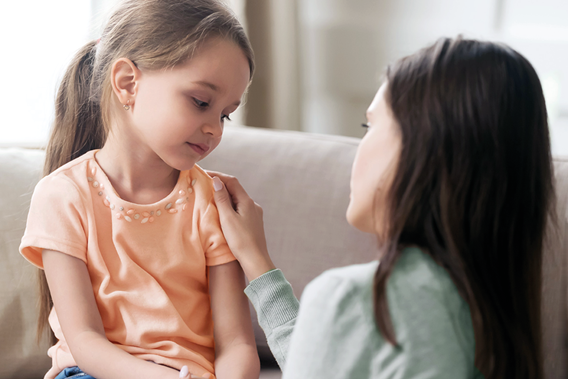
Separation: How to make it work when you have young children

Written by: Nanny Secours
Going through a breakup is never easy, especially when you have children. A lot of questions will come up along the way. Here are some tips to help you deal with what can seem like a huge mountain to climb and to make your separation as smooth as possible.
How do you tell your children about the separation?
-
Prepare yourself by working out the practical details in advance
It’s best to prepare yourself by working out the practical details in advance, such as custody of the children, living arrangements, and dates for moving in and out. That way, you’ll be able to explain the situation to the children by giving them a clear picture of what will happen next.
-
Announce the separation together if possible
Decide in advance where and when to talk about it. If possible, plan to do it together to reassure your children that even though their parents are separating, they’re not separating from their children. You can add that even though there will be days when you won’t be around, both parents will always love them.
When children are young, they don’t yet have a concept of time, so it’s important not to plan an announcement too far in advance. For children under age five, for example, tell them two weeks before the actual separation.
-
Be clear and take the responsibility for the situation away from the children
Use clear and simple words your child will understand. Keep sentences short and take the child’s age into account. Younger children need fewer details, while older children may ask for more. Make it very clear to your child that they’re not responsible for the separation, that it’s about grownup things, and that there’s nothing they could have done to avoid the situation. This will help them understand that it’s final.
Managing the emotional fallout
Separation causes imbalance and emotional fragility. Like adults, children go through a grieving process. You must let them experience the emotions triggered by a separation and support them.
It’s also a good idea to let other adults in your child’s life (such as their educator or teacher) know that they are going through a difficult time. Then your child can verbalize their feelings and what’s happened if necessary.
Managing the practical and financial aspects
Custody and child support are two things that must be considered from the outset when a couple splits their finances after separation. You need to talk about these issues very early on.
There are three ways to do this:
- Amicable agreement: This is the solution when parents are open to dialogue and have a common vision concerning the well-being and interests of their children.
- Mediation: This is a “conflict resolution method in which an impartial mediator helps the spouses negotiate a fair and viable agreement that meets the needs of each family member and to which free and enlightened consent is given.” You can consult Association des médiateurs familiaux du Québec if needed.
Please note that the government of Quebec offers five free mediation sessions. To be eligible, you must have previously attended the session on parenting after separation. These are free sessions held at your local courthouse.
- Legal recourse: If you cannot come to an agreement, decisions must be made by a judge. You can hire a lawyer to represent you. This option is the most costly, both financially and psychologically. The court process can be particularly stressful for parents, but also for children. For more information, consult the Quebec Bar (Barreau du Québec).
Shared custody is when children spend between 40% and 60% of their time with each parent. It can be arranged in a number of ways, the important thing being to adjust as you go along based on how the children are coping. Nothing is set in stone—you can change the custody arrangement over time.
In the event of a separation, you also need to notify Retraite Québec and Canada Revenue Agency for the Canada child benefit 90 days after the legal separation (when you have stopped living together). Depending on the type of custody, the benefit may or may not be shared.
How to interact with your children and former spouse
To preserve harmony, it’s important to maintain parental cohesion and work together as co-parents as much as possible. You’re no longer a loving couple, but you’ll always be a parental “couple” for the children. Co-parenting is defined as a healthy collaboration between parents who, despite the separation, ensure that the children’s needs are met.
Communication between parents is therefore essential and must remain respectful. Parents should also accept the differences in the way each household is run—as long as it’s in the best interest of the children—and stay consistent. It’s best to avoid arguing in front of the children and resolve any conflicts without them being present.
What about the child’s routine?
To reassure your children, maintain the routine they’re familiar with for as long as possible. If custody is shared, establishing the same type of routine in both homes will help children feel safe.
Where can I go for outside help?
A breakup is an unsettling time in a family’s life. So don’t hesitate to ask for help, either for yourself or to help your children get through this change.
There are many resources available, including your family doctor, psychologists, psychoeducators, social workers, specialized education teachers, family coaches, and other resources at your school or daycare, the CLSC in your area, or via the Info-Social 811 line.
Perrine Mangeot
Family Coach and Physical Therapist
Member of Réseau Nanny secours


